人教版(2019)必修第三册:Unit1 Festivals and Celebrations 学案(无答案)
文档属性
| 名称 | 人教版(2019)必修第三册:Unit1 Festivals and Celebrations 学案(无答案) | 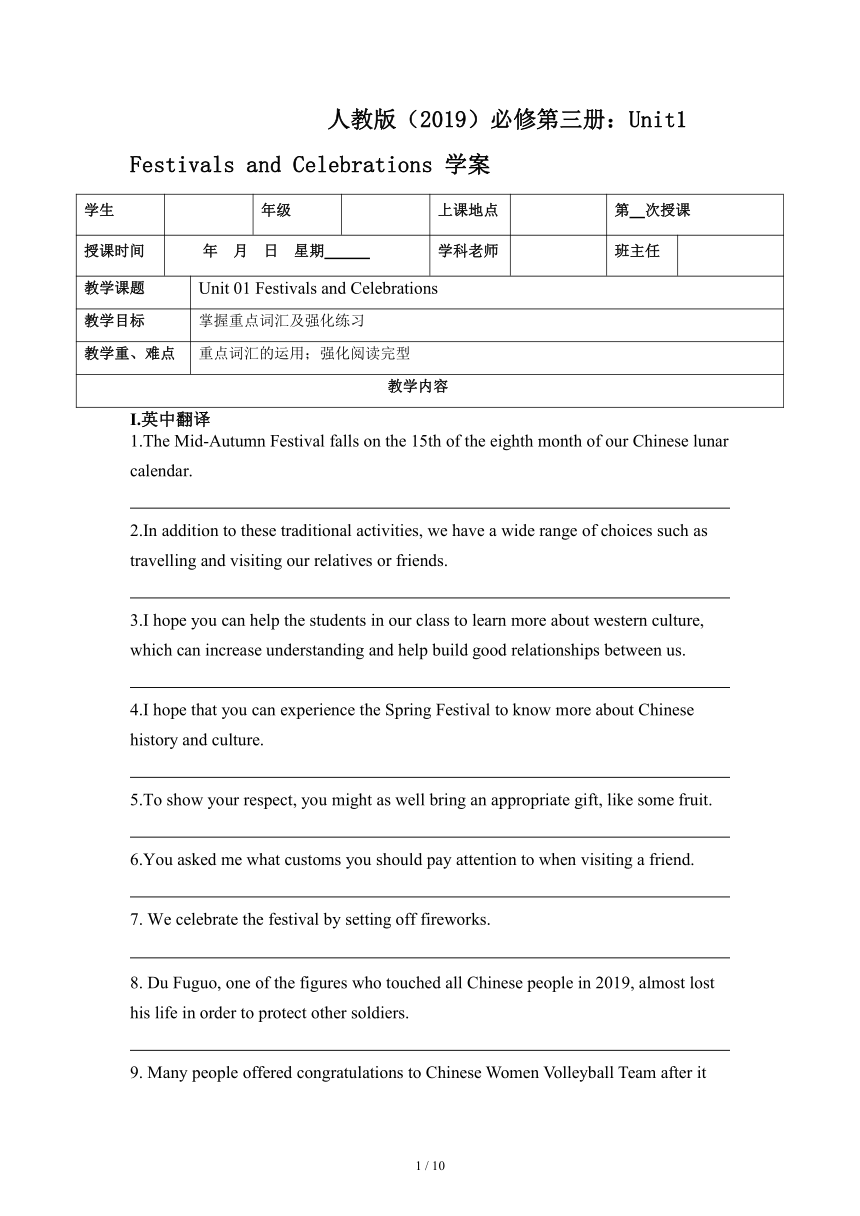 | |
| 格式 | docx | ||
| 文件大小 | 36.4KB | ||
| 资源类型 | 教案 | ||
| 版本资源 | 人教版(2019) | ||
| 科目 | 英语 | ||
| 更新时间 | 2022-01-14 10:25:11 | ||
图片预览

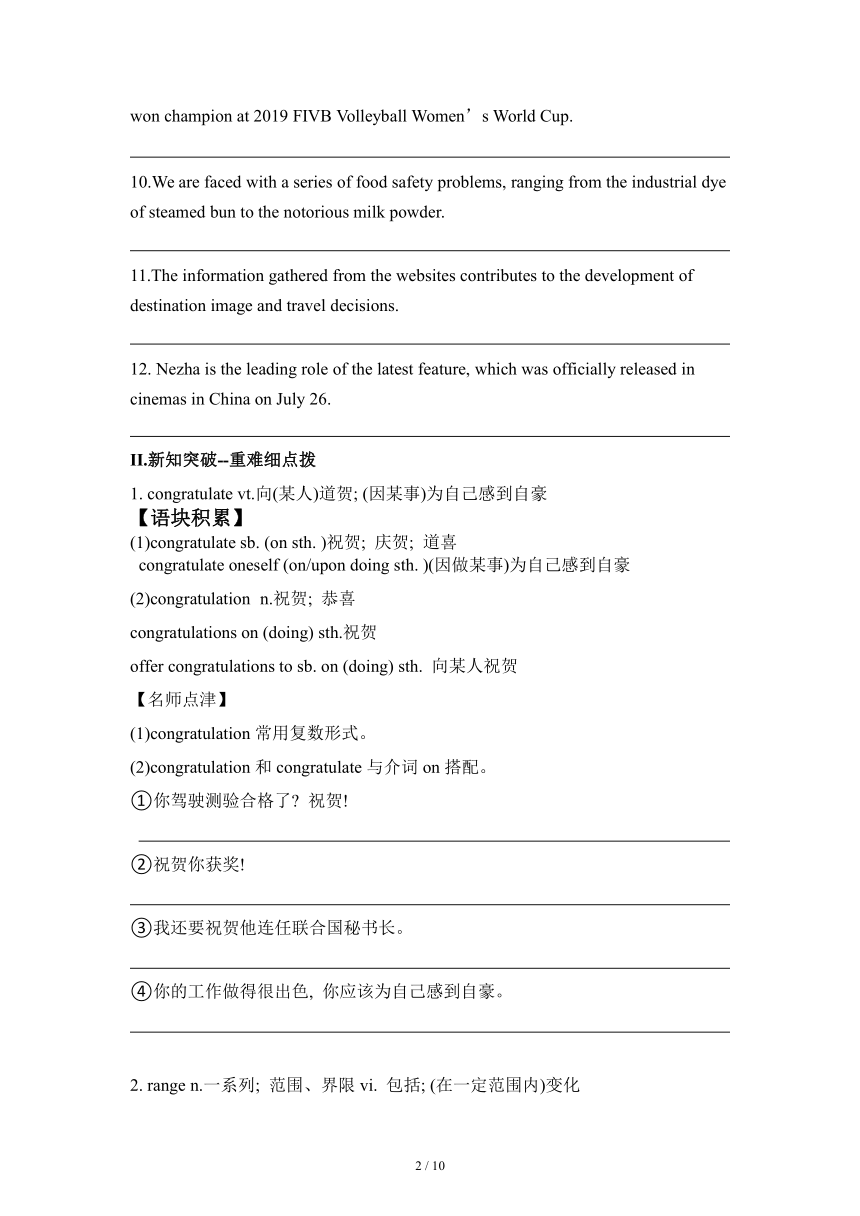
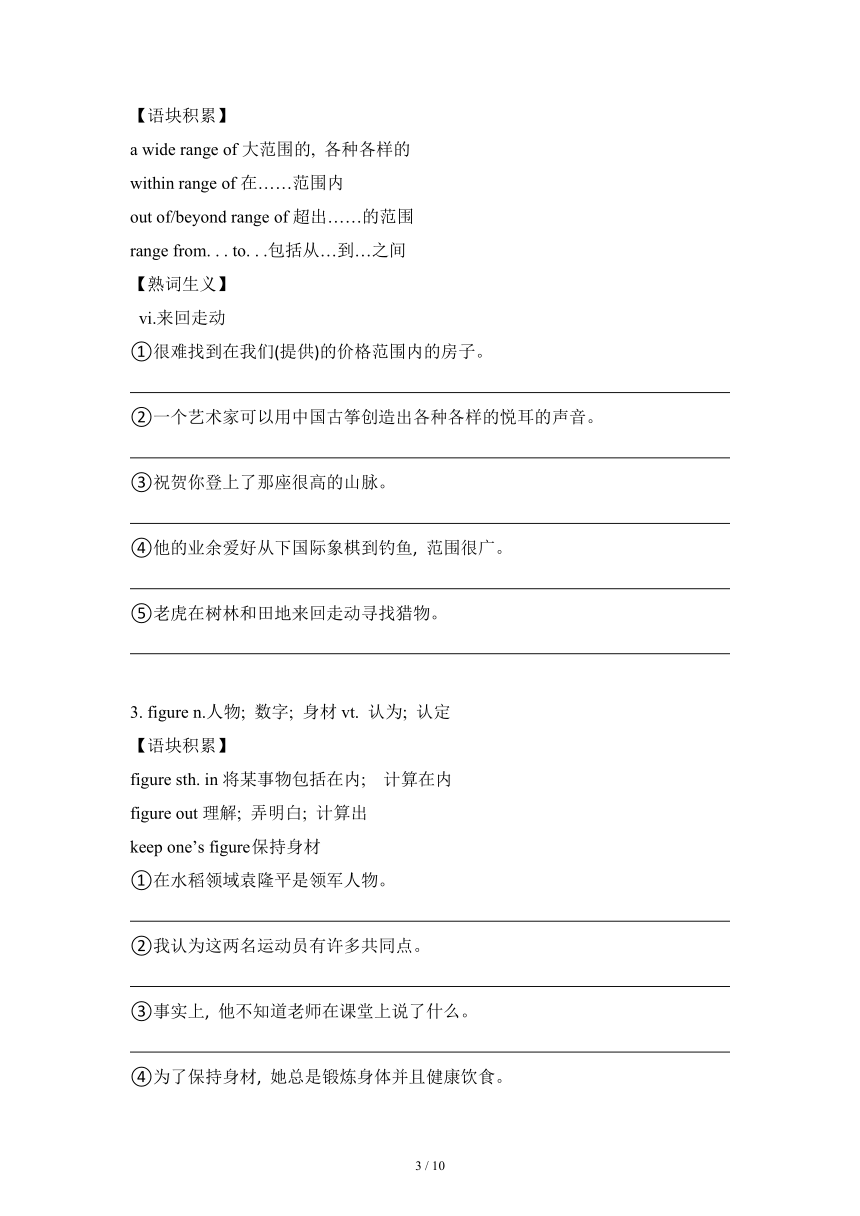
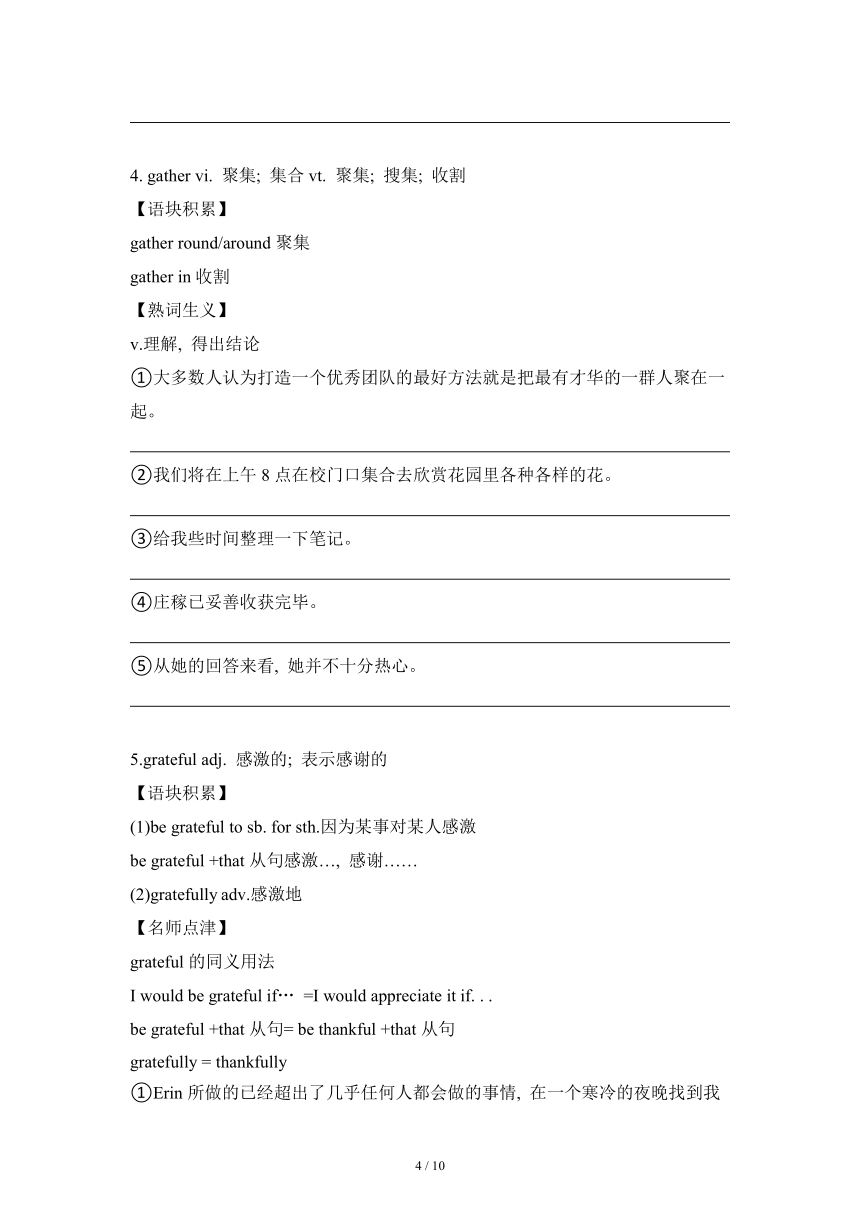
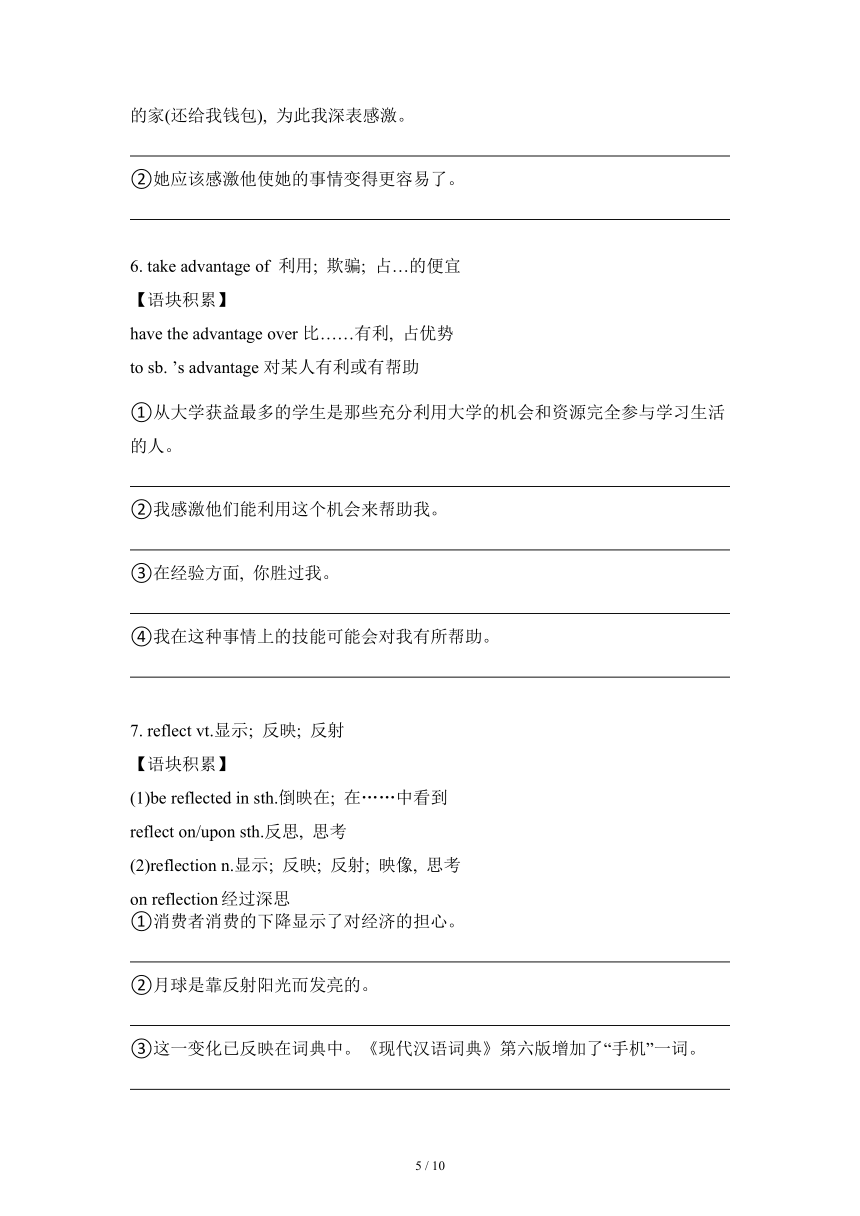
文档简介
教学内容
I.英中翻译
1.The Mid-Autumn Festival falls on the 15th of the eighth month of our Chinese lunar calendar.
2.In addition to these traditional activities, we have a wide range of choices such as travelling and visiting our relatives or friends.
3.I hope you can help the students in our class to learn more about western culture, which can increase understanding and help build good relationships between us.
4.I hope that you can experience the Spring Festival to know more about Chinese history and culture.
5.To show your respect, you might as well bring an appropriate gift, like some fruit.
6.You asked me what customs you should pay attention to when visiting a friend.
7. We celebrate the festival by setting off fireworks.
8. Du Fuguo, one of the figures who touched all Chinese people in 2019, almost lost his life in order to protect other soldiers.
9. Many people offered congratulations to Chinese Women Volleyball Team after it won champion at 2019 FIVB Volleyball Women’s World Cup.
10.We are faced with a series of food safety problems, ranging from the industrial dye of steamed bun to the notorious milk powder.
11.The information gathered from the websites contributes to the development of destination image and travel decisions.
12. Nezha is the leading role of the latest feature, which was officially released in cinemas in China on July 26.
II.新知突破--重难细点拨
1. congratulate vt.向(某人)道贺; (因某事)为自己感到自豪
【语块积累】
(1)congratulate sb. (on sth. )祝贺; 庆贺; 道喜
congratulate oneself (on/upon doing sth. )(因做某事)为自己感到自豪
(2)congratulation n.祝贺; 恭喜
congratulations on (doing) sth.祝贺
offer congratulations to sb. on (doing) sth. 向某人祝贺
【名师点津】
(1)congratulation常用复数形式。
(2)congratulation和congratulate与介词on搭配。
①你驾驶测验合格了 祝贺!
②祝贺你获奖!
③我还要祝贺他连任联合国秘书长。
④你的工作做得很出色, 你应该为自己感到自豪。
2. range n.一系列; 范围、界限vi. 包括; (在一定范围内)变化
【语块积累】
a wide range of大范围的, 各种各样的
within range of在……范围内
out of/beyond range of超出……的范围
range from. . . to. . .包括从…到…之间
【熟词生义】
vi.来回走动
①很难找到在我们(提供)的价格范围内的房子。
②一个艺术家可以用中国古筝创造出各种各样的悦耳的声音。
③祝贺你登上了那座很高的山脉。
④他的业余爱好从下国际象棋到钓鱼, 范围很广。
⑤老虎在树林和田地来回走动寻找猎物。
3. figure n.人物; 数字; 身材vt. 认为; 认定
【语块积累】
figure sth. in将某事物包括在内; 计算在内
figure out理解; 弄明白; 计算出
keep one’s figure 保持身材
①在水稻领域袁隆平是领军人物。
②我认为这两名运动员有许多共同点。
③事实上, 他不知道老师在课堂上说了什么。
④为了保持身材, 她总是锻炼身体并且健康饮食。
4. gather vi. 聚集; 集合vt. 聚集; 搜集; 收割
【语块积累】
gather round/around聚集
gather in收割
【熟词生义】
v.理解, 得出结论
①大多数人认为打造一个优秀团队的最好方法就是把最有才华的一群人聚在一起。
②我们将在上午8点在校门口集合去欣赏花园里各种各样的花。
③给我些时间整理一下笔记。
④庄稼已妥善收获完毕。
⑤从她的回答来看, 她并不十分热心。
5.grateful adj. 感激的; 表示感谢的
【语块积累】
(1)be grateful to sb. for sth.因为某事对某人感激
be grateful +that从句感激…, 感谢……
(2)gratefully adv.感激地
【名师点津】
grateful的同义用法
I would be grateful if… =I would appreciate it if. . .
be grateful +that从句= be thankful +that从句
gratefully = thankfully
①Erin所做的已经超出了几乎任何人都会做的事情, 在一个寒冷的夜晚找到我的家(还给我钱包), 为此我深表感激。
②她应该感激他使她的事情变得更容易了。
6. take advantage of 利用; 欺骗; 占…的便宜
【语块积累】
have the advantage over比……有利, 占优势
to sb. ’s advantage对某人有利或有帮助
①从大学获益最多的学生是那些充分利用大学的机会和资源完全参与学习生活的人。
②我感激他们能利用这个机会来帮助我。
③在经验方面, 你胜过我。
④我在这种事情上的技能可能会对我有所帮助。
7. reflect vt.显示; 反映; 反射
【语块积累】
(1)be reflected in sth.倒映在; 在……中看到
reflect on/upon sth.反思, 思考
(2)reflection n.显示; 反映; 反射; 映像, 思考
on reflection 经过深思
①消费者消费的下降显示了对经济的担心。
②月球是靠反射阳光而发亮的。
③这一变化已反映在词典中。《现代汉语词典》第六版增加了“手机”一词。
④你应该利用这次机会反思你的工作。
⑤我们的报纸旨在反映当地社区的看法。
⑥起初我不同意, 但是经过深思, 我意识到她是正确的。
8. have sth. in common (兴趣、想法等方面)相同; 有相同的特征
【语块积累】
have nothing/little in common with. . . 和……没有/几乎没有共同点
have everything/much/a lot in common with. . . 和…完全相同/有很多共同点
in common with sb. /sth. 与某人/某物一样
①我们有很多相同之处。
②我和简毫无共同之处。
③和许多人一样, 她经常反思她的所作所为。
④这两项比赛有很多共同点。
⑤我发现我和这些人没有相同之处。
⑥和许多其他国家一样, 我们主要在发展经济。
9. However, no matter how different they may seem, all over the world, the spirit of sharing joy, gratitude, love, or peace is common in all festivals. 然而, 无论它们看起来多么不同, 在全世界, 分享快乐、感恩、爱或者和平的精神存在于所有的节日中。
【句式解构】
(1)该句为复合句, no matter how相当于however, 引导让步状语从句。
(2)“no matter+特殊疑问词”引导让步状语从句时, 相当于“特殊疑问词+-ever”。
【名师点津】引导让步状语从句的词或词组
whatever, whoever, whichever不仅可以引导让步状语从句还可以引导名词性从句, 但no matter what/who/which只能引导让步状语从句。
①无论我们锻炼多少, 无论我们吃得多好, 如果没有充足的睡眠, 我们就不会有健康的身体。
②无论谁能回答我的一个问题, 他/她就能获奖。
③提供的课程多达10种, 你可以自由选择最适合你的。
④不管谁进入餐馆, 我们经常端上热乎乎的食物。
10. Online shopping websites and social media apps have made it much easier for the public to spend more on gifts for their loved ones. 网上的购物网站和社交媒体应用软件使得公众为他们所爱的人花更多钱买礼物变得更容易。
【句式解构】
(1)该句是简单句, 其中it作形式宾语, 动词不定式作真正的宾语。
(2)it作形式宾语时, 常用于以下结构中: make/find/think/consider + it + adj. /n. +动词不定式/动词-ing形式/从句; like/hate/depend on+it+从句; take it for granted +that从句/动词不定式。
【要点拾遗】
dress (sb. ) up穿上盛装; 装扮
【语块积累】
dress up as装扮成
be dressed in 穿着
【易混辨析】
put on着重于“穿”这一动作, 即由没穿到穿这一过程的完成, 意为“穿上”
wear强调“穿着”这一状态时, 相当于be dressed in, 也可表示“戴着”
dress既可表示动作, 又可表示状态, 常由人作宾语, 意为“给…穿衣服”
be in强调“穿着, 戴着”的状态, 后面多接颜色或表示衣服的词
①乔治说得很明白他想要什么。
②我认为两点钟来较为方便。
③即便是现在我还发现相信她的描述很难。
④我喜欢你笑的时候。
⑤他认为改善工人的居住状况是他的责任。
⑥老师已经明确表示每个人都要遵守学校制度。
⑦她喜欢盛装出席晚会。
⑧在孩子们跳舞之前, 她把孩子们打扮得漂漂亮亮。
Section Ⅲ Discovering Useful Structures --动词-ing形式作定语和表语
【要义详析】
动词-ing由“动词原形+-ing” 构成。动词-ing形式可在句中作主语、宾语、表语、定语、宾语补足语和状语, 但不能单独作谓语。
1. 动词-ing形式作定语
如果是单个的动词-ing形式作定语, 常放在被修饰词前作前置定语; 如果是动词-ing形式短语作定语, 则放在被修饰词后作后置定语。
Make less noise. There’s a sleeping child.不要发出太大声音, 有个正在睡觉的孩子。
He asked me an embarrassing question.他问了我一个令人尴尬的问题。
The young man sitting between John and Mary is the editor of the campus newspaper.
坐在约翰和玛丽之间的那个年轻小伙子是校园报的编辑。
The man being questioned is connected with the traffic accident. 正在被提问的那个人和这起交通事故有关。
The patient has stayed in the waiting room for half an hour.那个病人在等候室里已经待了半小时。
There is a swimming pool behind the beautiful garden.在这个美丽的花园后面有一个游泳池。
【易错精点】
1.表示感情的动词-ing形式作定语时, 表示“令人……的”, 此类动词-ed形式作定语时, 表示“感到……的”。
2.动词-ing形式作定语如果与被修饰的词之间是被动关系, 且强调动作正在进行就用动词-ing形式的被动式, 即being done的形式。
【知识延伸】
动词-ing形式作定语的两种作用
1.用来说明被修饰的名词
a waiting room = a room for waiting等候室
a walking stick = a stick for walking拐杖
a sleeping car=a car for sleeping卧铺
2.指所修饰的名词正在进行的动作, 与被修饰词之间是主动关系, 可以换成定语从句的形式
a man waiting at the stop= a man who is waiting at the stop在停车点等候的人
a sleeping child = a child who is sleeping正在睡觉的孩子
【即学活用】句型转换
(1)The taxi that took us to the airport broke down. →The taxi ______us to the airport broke down.
(2)The problem that is being discussed is about food safety. →The problem ______________is about food safety.
(3)The student stayed in the room used for reading for an hour. →The student stayed _________________for an
hour.
(4) That was an experience that frightened everyone. →That was _____________________.
2. 动词-ing形式作表语
一种表示主语的特质、特征和状态, 其作用相当于形容词; 另一种具体说明主语的内容, 即主语等同于表语, 两者可互换。
The music they are playing sounds so exciting.他们演奏的音乐听起来令人激动。
The result is disappointing. 结果令人失望。
Our job is playing all kinds of music.我们的工作就是演奏各种音乐。
Seeing is believing. 眼见为实。
【即学活用】语法填空
(1)It is ________(amaze) that the boy is able to solve the problem so quickly.
(2)Buying a car is simply _______(waste) money.
(3)Please stop making the noise—it’s getting ________(annoy).
I.英中翻译
1.The Mid-Autumn Festival falls on the 15th of the eighth month of our Chinese lunar calendar.
2.In addition to these traditional activities, we have a wide range of choices such as travelling and visiting our relatives or friends.
3.I hope you can help the students in our class to learn more about western culture, which can increase understanding and help build good relationships between us.
4.I hope that you can experience the Spring Festival to know more about Chinese history and culture.
5.To show your respect, you might as well bring an appropriate gift, like some fruit.
6.You asked me what customs you should pay attention to when visiting a friend.
7. We celebrate the festival by setting off fireworks.
8. Du Fuguo, one of the figures who touched all Chinese people in 2019, almost lost his life in order to protect other soldiers.
9. Many people offered congratulations to Chinese Women Volleyball Team after it won champion at 2019 FIVB Volleyball Women’s World Cup.
10.We are faced with a series of food safety problems, ranging from the industrial dye of steamed bun to the notorious milk powder.
11.The information gathered from the websites contributes to the development of destination image and travel decisions.
12. Nezha is the leading role of the latest feature, which was officially released in cinemas in China on July 26.
II.新知突破--重难细点拨
1. congratulate vt.向(某人)道贺; (因某事)为自己感到自豪
【语块积累】
(1)congratulate sb. (on sth. )祝贺; 庆贺; 道喜
congratulate oneself (on/upon doing sth. )(因做某事)为自己感到自豪
(2)congratulation n.祝贺; 恭喜
congratulations on (doing) sth.祝贺
offer congratulations to sb. on (doing) sth. 向某人祝贺
【名师点津】
(1)congratulation常用复数形式。
(2)congratulation和congratulate与介词on搭配。
①你驾驶测验合格了 祝贺!
②祝贺你获奖!
③我还要祝贺他连任联合国秘书长。
④你的工作做得很出色, 你应该为自己感到自豪。
2. range n.一系列; 范围、界限vi. 包括; (在一定范围内)变化
【语块积累】
a wide range of大范围的, 各种各样的
within range of在……范围内
out of/beyond range of超出……的范围
range from. . . to. . .包括从…到…之间
【熟词生义】
vi.来回走动
①很难找到在我们(提供)的价格范围内的房子。
②一个艺术家可以用中国古筝创造出各种各样的悦耳的声音。
③祝贺你登上了那座很高的山脉。
④他的业余爱好从下国际象棋到钓鱼, 范围很广。
⑤老虎在树林和田地来回走动寻找猎物。
3. figure n.人物; 数字; 身材vt. 认为; 认定
【语块积累】
figure sth. in将某事物包括在内; 计算在内
figure out理解; 弄明白; 计算出
keep one’s figure 保持身材
①在水稻领域袁隆平是领军人物。
②我认为这两名运动员有许多共同点。
③事实上, 他不知道老师在课堂上说了什么。
④为了保持身材, 她总是锻炼身体并且健康饮食。
4. gather vi. 聚集; 集合vt. 聚集; 搜集; 收割
【语块积累】
gather round/around聚集
gather in收割
【熟词生义】
v.理解, 得出结论
①大多数人认为打造一个优秀团队的最好方法就是把最有才华的一群人聚在一起。
②我们将在上午8点在校门口集合去欣赏花园里各种各样的花。
③给我些时间整理一下笔记。
④庄稼已妥善收获完毕。
⑤从她的回答来看, 她并不十分热心。
5.grateful adj. 感激的; 表示感谢的
【语块积累】
(1)be grateful to sb. for sth.因为某事对某人感激
be grateful +that从句感激…, 感谢……
(2)gratefully adv.感激地
【名师点津】
grateful的同义用法
I would be grateful if… =I would appreciate it if. . .
be grateful +that从句= be thankful +that从句
gratefully = thankfully
①Erin所做的已经超出了几乎任何人都会做的事情, 在一个寒冷的夜晚找到我的家(还给我钱包), 为此我深表感激。
②她应该感激他使她的事情变得更容易了。
6. take advantage of 利用; 欺骗; 占…的便宜
【语块积累】
have the advantage over比……有利, 占优势
to sb. ’s advantage对某人有利或有帮助
①从大学获益最多的学生是那些充分利用大学的机会和资源完全参与学习生活的人。
②我感激他们能利用这个机会来帮助我。
③在经验方面, 你胜过我。
④我在这种事情上的技能可能会对我有所帮助。
7. reflect vt.显示; 反映; 反射
【语块积累】
(1)be reflected in sth.倒映在; 在……中看到
reflect on/upon sth.反思, 思考
(2)reflection n.显示; 反映; 反射; 映像, 思考
on reflection 经过深思
①消费者消费的下降显示了对经济的担心。
②月球是靠反射阳光而发亮的。
③这一变化已反映在词典中。《现代汉语词典》第六版增加了“手机”一词。
④你应该利用这次机会反思你的工作。
⑤我们的报纸旨在反映当地社区的看法。
⑥起初我不同意, 但是经过深思, 我意识到她是正确的。
8. have sth. in common (兴趣、想法等方面)相同; 有相同的特征
【语块积累】
have nothing/little in common with. . . 和……没有/几乎没有共同点
have everything/much/a lot in common with. . . 和…完全相同/有很多共同点
in common with sb. /sth. 与某人/某物一样
①我们有很多相同之处。
②我和简毫无共同之处。
③和许多人一样, 她经常反思她的所作所为。
④这两项比赛有很多共同点。
⑤我发现我和这些人没有相同之处。
⑥和许多其他国家一样, 我们主要在发展经济。
9. However, no matter how different they may seem, all over the world, the spirit of sharing joy, gratitude, love, or peace is common in all festivals. 然而, 无论它们看起来多么不同, 在全世界, 分享快乐、感恩、爱或者和平的精神存在于所有的节日中。
【句式解构】
(1)该句为复合句, no matter how相当于however, 引导让步状语从句。
(2)“no matter+特殊疑问词”引导让步状语从句时, 相当于“特殊疑问词+-ever”。
【名师点津】引导让步状语从句的词或词组
whatever, whoever, whichever不仅可以引导让步状语从句还可以引导名词性从句, 但no matter what/who/which只能引导让步状语从句。
①无论我们锻炼多少, 无论我们吃得多好, 如果没有充足的睡眠, 我们就不会有健康的身体。
②无论谁能回答我的一个问题, 他/她就能获奖。
③提供的课程多达10种, 你可以自由选择最适合你的。
④不管谁进入餐馆, 我们经常端上热乎乎的食物。
10. Online shopping websites and social media apps have made it much easier for the public to spend more on gifts for their loved ones. 网上的购物网站和社交媒体应用软件使得公众为他们所爱的人花更多钱买礼物变得更容易。
【句式解构】
(1)该句是简单句, 其中it作形式宾语, 动词不定式作真正的宾语。
(2)it作形式宾语时, 常用于以下结构中: make/find/think/consider + it + adj. /n. +动词不定式/动词-ing形式/从句; like/hate/depend on+it+从句; take it for granted +that从句/动词不定式。
【要点拾遗】
dress (sb. ) up穿上盛装; 装扮
【语块积累】
dress up as装扮成
be dressed in 穿着
【易混辨析】
put on着重于“穿”这一动作, 即由没穿到穿这一过程的完成, 意为“穿上”
wear强调“穿着”这一状态时, 相当于be dressed in, 也可表示“戴着”
dress既可表示动作, 又可表示状态, 常由人作宾语, 意为“给…穿衣服”
be in强调“穿着, 戴着”的状态, 后面多接颜色或表示衣服的词
①乔治说得很明白他想要什么。
②我认为两点钟来较为方便。
③即便是现在我还发现相信她的描述很难。
④我喜欢你笑的时候。
⑤他认为改善工人的居住状况是他的责任。
⑥老师已经明确表示每个人都要遵守学校制度。
⑦她喜欢盛装出席晚会。
⑧在孩子们跳舞之前, 她把孩子们打扮得漂漂亮亮。
Section Ⅲ Discovering Useful Structures --动词-ing形式作定语和表语
【要义详析】
动词-ing由“动词原形+-ing” 构成。动词-ing形式可在句中作主语、宾语、表语、定语、宾语补足语和状语, 但不能单独作谓语。
1. 动词-ing形式作定语
如果是单个的动词-ing形式作定语, 常放在被修饰词前作前置定语; 如果是动词-ing形式短语作定语, 则放在被修饰词后作后置定语。
Make less noise. There’s a sleeping child.不要发出太大声音, 有个正在睡觉的孩子。
He asked me an embarrassing question.他问了我一个令人尴尬的问题。
The young man sitting between John and Mary is the editor of the campus newspaper.
坐在约翰和玛丽之间的那个年轻小伙子是校园报的编辑。
The man being questioned is connected with the traffic accident. 正在被提问的那个人和这起交通事故有关。
The patient has stayed in the waiting room for half an hour.那个病人在等候室里已经待了半小时。
There is a swimming pool behind the beautiful garden.在这个美丽的花园后面有一个游泳池。
【易错精点】
1.表示感情的动词-ing形式作定语时, 表示“令人……的”, 此类动词-ed形式作定语时, 表示“感到……的”。
2.动词-ing形式作定语如果与被修饰的词之间是被动关系, 且强调动作正在进行就用动词-ing形式的被动式, 即being done的形式。
【知识延伸】
动词-ing形式作定语的两种作用
1.用来说明被修饰的名词
a waiting room = a room for waiting等候室
a walking stick = a stick for walking拐杖
a sleeping car=a car for sleeping卧铺
2.指所修饰的名词正在进行的动作, 与被修饰词之间是主动关系, 可以换成定语从句的形式
a man waiting at the stop= a man who is waiting at the stop在停车点等候的人
a sleeping child = a child who is sleeping正在睡觉的孩子
【即学活用】句型转换
(1)The taxi that took us to the airport broke down. →The taxi ______us to the airport broke down.
(2)The problem that is being discussed is about food safety. →The problem ______________is about food safety.
(3)The student stayed in the room used for reading for an hour. →The student stayed _________________for an
hour.
(4) That was an experience that frightened everyone. →That was _____________________.
2. 动词-ing形式作表语
一种表示主语的特质、特征和状态, 其作用相当于形容词; 另一种具体说明主语的内容, 即主语等同于表语, 两者可互换。
The music they are playing sounds so exciting.他们演奏的音乐听起来令人激动。
The result is disappointing. 结果令人失望。
Our job is playing all kinds of music.我们的工作就是演奏各种音乐。
Seeing is believing. 眼见为实。
【即学活用】语法填空
(1)It is ________(amaze) that the boy is able to solve the problem so quickly.
(2)Buying a car is simply _______(waste) money.
(3)Please stop making the noise—it’s getting ________(annoy).
